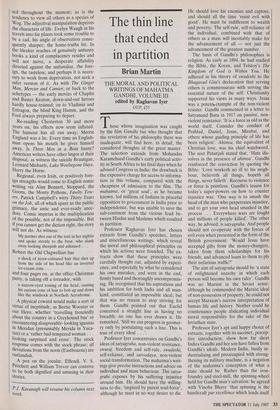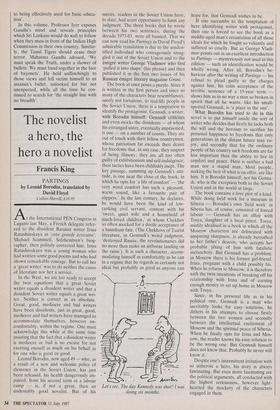The thin line that ended in partition
Brian Martin
THE MORAL AND POLITICAL WRITINGS OF MAHATMA GANDHI, VOLUME III edited by Raghavan Iyer OUP, .£55 Those whose imagination was caught by the film Gandhi but who thought that the revelation of his philosophy there was inadequate, will find here, in detail, the considered thoughts of the great master. The selection extends from Mohandas Karamchand Gandhi's early political activ- ity in South Africa to his final days when he advised Congress in India: the drawback is the expensive charge for access to informa- tion in this volume, compared with the cheapness of admission to the film. The mahatma, or 'great soul', as he became known, led millions of Indians in peaceful opposition to government in India prior to independence, but was unable to save the sub-continent from the vicious feud be- tween Hindus and Moslems which resulted in partition.
Professor Raghavan Iyer has chosen extracts from Gandhi's speeches, letters and miscellaneous writings, which reveal the moral and philosophical principles on which his actions were founded. The ex- tracts show that these principles were carefully thought out, adjusted by experi- ence, and especially by what he considered his own mistakes, and were in the end, firmly based and thoroughly uncompromis- ing. He recognised that his aspirations and his ambition for both India and all man- kind, constituted an impossible ideal; but that was no reason to stop striving for them. Gandhi pointed out that Euclid conceived a straight line as having no breadth: no one has ever drawn it. He remarked, 'Still we can progress in geomet- ry only by postulating such a line. This is true of every ideal . . .'.
Professor Iyer concentrates on Gandhi's ideas of satyagraha, non-violent resistance, swaraj, freedom and self-rule, swadeshi, self-reliance, and sarvodaya, non-violent social transformation. The mahatma's writ- ings give precise instructions and advice on individual and mass behaviour. The satya- grahi exposes by his suffering injustice around him. He should have the willing- ness to die, 'inspired by purest soul-force', although he must in no way desire to die.
He should love his enemies and captors, and should all the time `resist evil with good'. He must be indifferent to wealth and poverty. The self-rule, self-reliance of the individual, combined with that of others as a mass will inevitably make for the advancement of all — not just the advancement of the greatest number.
The basis of Gandhi's philosophies is religion. As early as 1894, he had studied the Bible, the Koran, and Tolstoy's The Kingdom of God is Within You. He adhered in his theory of swadeshi to the Bhagavad Gita's declaration that serving others is commensurate with serving the essential nature of the self. Christianity supported his views in many ways. Jesus was a potent. example of the non-violent resister. Gandhi commented in a letter to Satyanand Butu in 1917 on passive, non- violent resistance: 'It is a force as old as the world itself. Consider the conduct of Prahlad, Daniel, Jesus, Mirabai, and others whose guiding principle of life has been religion'. Ahimsa, the equivalent of Christian love, was his chief watchword. The seer Patanjali stated that, 'Hate dis- solves in the presence of ahimsa' . Gandhi reinforced the conviction by quoting the Bible: 'Love worketh no ill to his neigh- bour, believeth all things, hopeth all things, never faileth'. Recourse to violence or force is pointless. Gandhi's lesson for today's super-powers on how to counter injustice was: 'One way is to smash the head of the man who perpetrates injustice, and to get your own head smashed in the process . . . Everywhere wars are fought and millions of people killed'. The other way, he advised, is satyagraha. And people should not co-operate with the forces of evil even when presented in the form of the British government: 'Would Jesus have accepted gifts from the money-changers, taken from them scholarships for his friends, and advanced loans to them to ply their nefarious traffic?'
The aim of satyagraha should be 'a state of enlightened anarchy in which each person will become his own ruler'. Gandhi was no Marxist in the Soviet sense: although he commended the Marxist ideal of non-possession of property, he could not accept Marxism's narrow interpretation of human life and history. Neither could he countenance people abdicating individual moral responsibility for the sake of the leviathan state.
Professor Iyer's apt and happy choice of extracts, together with its succinct, percep- tive introduction, show how far short Indira Gandhi and her son have fallen from Gandhi's ideals. Modern India, busily in- dustrialising and preoccupied with streng- thening its military machine, is a negation of the mahatma's conception of what a state should be. Rather than the iron- foundry and steel-mill, the spinning-wheel held for Gandhi man's salvation: he agreed with Vinoba Bhave 'that spinning is the handicraft par excellence which lends itself
to being effectively used for basic educa- tion'.
In this volume, Professor Iyer exposes Gandhi's mind and reveals principles which Sri Lankans would do well to follow when they mass in front of the Indian High Commission in their own country. Similar- ly, the Tamil Tigers should cease their terror. Mahatma Gandhi advised, 'We must speak the Truth, under a shower of bullets. We must band together in the face of bayonets'. He held unflinchingly to those views and fell victim himself to an assassin's bullet, unlooked for but not unexpected, while all the time he con- tinued to search for 'the straight line with no breadth'.



















































 Previous page
Previous page